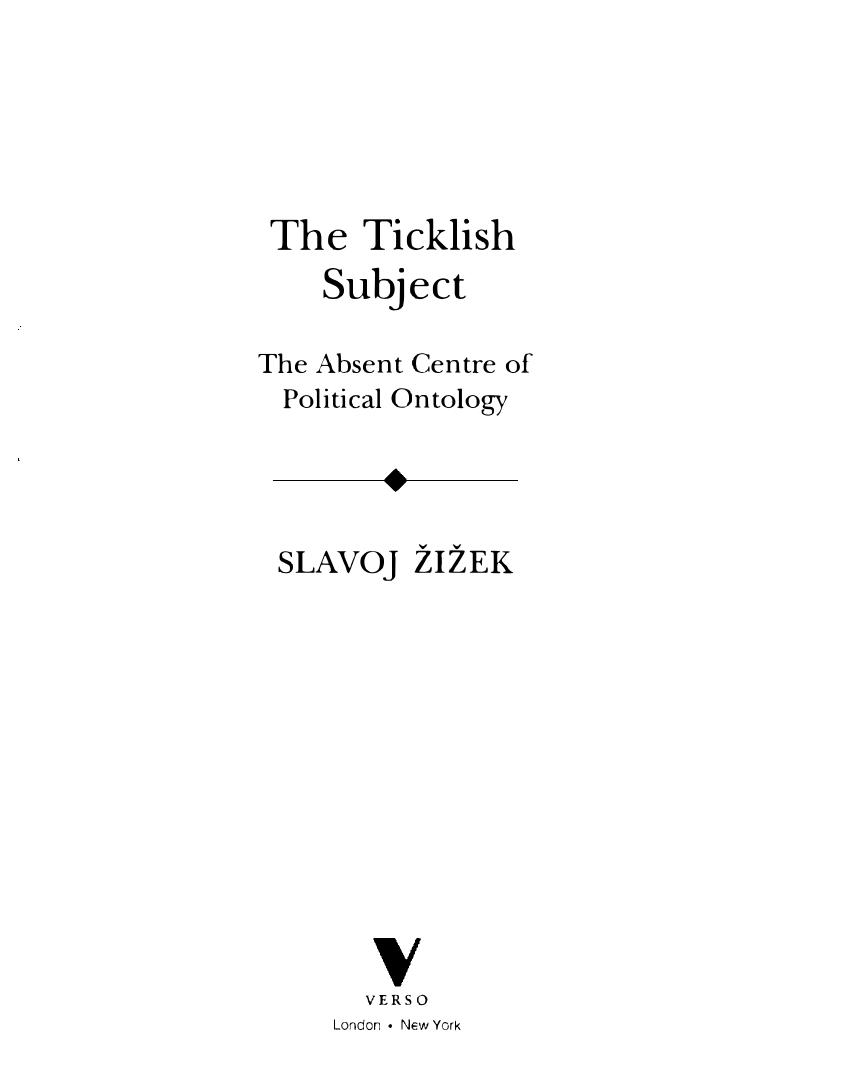The Ticklish Subject: The Absent Centre of Political Ontology by Slavoj Žižek

Author:Slavoj Žižek
Language: eng
Format: epub, pdf
Publisher: Verso
For a leftist suspension of the Law
How, then, do Leftists who are aware of this falsity of multiculturalist postmodernism react to it? Their reaction assumes the form of the Hegelian infinite judgement, which posits the speculative identity of two thoroughly incompatible terms: âAdorno (the most sophisticated âelitistâ critical theorist) is Buchanan (the lowest point of American rightist populism).â47 That is to say: these critics of postmodern multiculturalist elitism (from Christopher Lasch to Paul Piccone) take the risk of endorsing neo-conservative populism, with its notions of the reassertion of community, local democracy and active citizenship, as the only politically relevant answer to the all-pervasive predominance of âinstrumental Reasonâ, of the bureaucratization and instrumentalization of our life-world.48 Of course, it is easy to dismiss todayâs populism as a nostalgic reactive formation against the process of modernization, and as such inherently paranoiac, in search of an external cause of malignancy, of a secret agent who pulls the strings and is thus responsible for the woes of modernization (Jews, international Capital, non-patriotic multiculturalist managers, state bureaucracy ⦠); the problem is, rather, to conceive of this new populism as a new form of âfalse transparencyâ which, far from presenting a serious obstacle to capitalist modernization, paves the way for it. What these leftist advocates of populism fail to perceive is thus the fact that todayâs populism, far from presenting a threat to global capitalism, remains its inherent product.
Paradoxically, todayâs true conservatives are, rather, leftist âcritical theoristsâ who reject both liberal multiculturalism and fundamentalist populism â who clearly perceive the complicity between global capitalism and ethnic fundamentalism. They point towards a third domain, which belongs neither to the global market society nor to the new forms of ethnic fundamentalism: the domain of the political, the public space of civil society, of active responsible citizenship (the fight for human rights, ecology, etc.). However, the problem is that this very form of political space is increasingly threatened by the onslaught of globalization; consequently, one cannot simply return to it or revitalize it: the post-nation-state logic of Capital remains the Real which lurks in the background, while all three main leftist reactions to the process of globalization (liberal multiculturalism; the attempt to embrace populism by discerning, beneath its fundamentalist appearance, resistance to âinstrumental reasonâ; the attempt to keep open the space of the political) seem inappropriate. Although the last approach is based on an accurate insight into the complicity between multiculturalism and fundamentalism, it avoids the crucial question: how are we to reinvent the political space in todayâs conditions of globalization? The politicization of the series of particular struggles which leaves the global process of Capital intact is clearly not sufficient. This means that one should reject the opposition which, within the frame of late capitalist liberal democracy, imposes itself as the main axis of ideological struggle: the tension between âopenâ post-ideological universalist liberal tolerance and the particularist ânew fundamentalismsâ. Against the liberal Centre which presents itself as neutral, post-ideological, relying on the rule of Law, one should reassert the old leftist motif of the necessity to suspend the neutral space of Law.
Download
The Ticklish Subject: The Absent Centre of Political Ontology by Slavoj Žižek.pdf
This site does not store any files on its server. We only index and link to content provided by other sites. Please contact the content providers to delete copyright contents if any and email us, we'll remove relevant links or contents immediately.
| Anthropology | Archaeology |
| Philosophy | Politics & Government |
| Social Sciences | Sociology |
| Women's Studies |
The remains of the day by Kazuo Ishiguro(7551)
Tools of Titans by Timothy Ferriss(6946)
The Black Swan by Nassim Nicholas Taleb(6190)
Inner Engineering: A Yogi's Guide to Joy by Sadhguru(5895)
Giovanni's Room by James Baldwin(5878)
The Way of Zen by Alan W. Watts(5799)
The Six Wives Of Henry VIII (WOMEN IN HISTORY) by Fraser Antonia(4790)
The Power of Now: A Guide to Spiritual Enlightenment by Eckhart Tolle(4755)
Astrophysics for People in a Hurry by Neil DeGrasse Tyson(4620)
Asking the Right Questions: A Guide to Critical Thinking by M. Neil Browne & Stuart M. Keeley(4574)
12 Rules for Life by Jordan B. Peterson(3734)
The Ethical Slut by Janet W. Hardy(3502)
Skin in the Game by Nassim Nicholas Taleb(3460)
Housekeeping by Marilynne Robinson(3401)
The Art of Happiness by The Dalai Lama(3383)
Double Down (Diary of a Wimpy Kid Book 11) by Jeff Kinney(3272)
Skin in the Game: Hidden Asymmetries in Daily Life by Nassim Nicholas Taleb(3264)
Walking by Henry David Thoreau(3234)
12 Rules for Life: An Antidote to Chaos by Jordan B. Peterson(3200)
